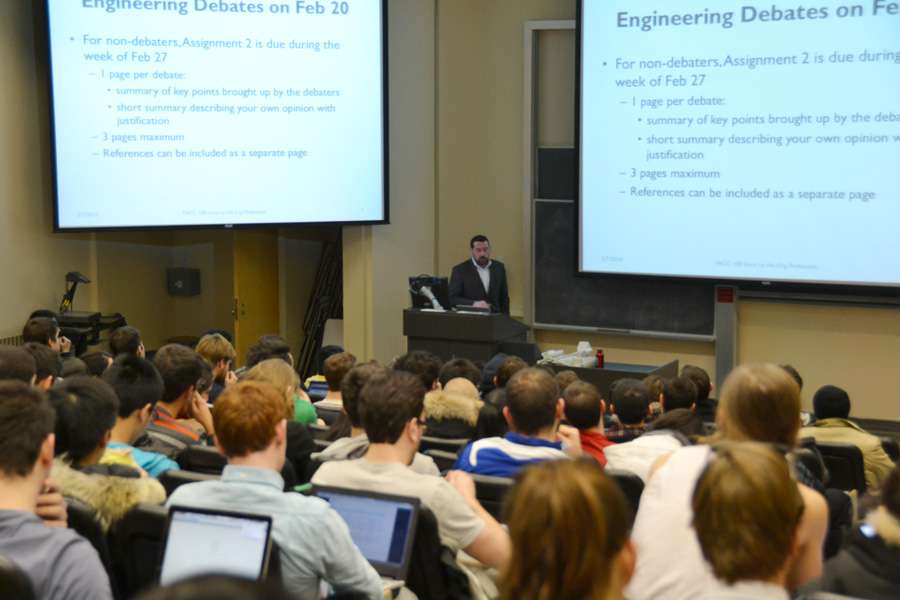A new presentation on social equity and safe spaces in the Faculty of Engineering piloted last week with guest lectures in a mandatory first-year course on Feb. 6 and 7.
The guest lecture is a result of an idea brought up last November at an open EUS discussion regarding sexism, racism, and other issues within the faculty. FACC 100 was chosen to host the presentation because it is a mandatory first-year course frequented by guest lectures.
“[In this class] there have been guest lectures from all departments of the Faculty to introduce students to all the different disciplines in Engineering,” said Christopher Tegho, the Engineering Undergraduate Society (EUS) Equity Commissioner. “After the EUS Safer Space [meeting], Josh Redel, Carlos (the EUS President), and I met with Professor Jim Nicell, Dean of Engineering, and discussed options to raise awareness about Safer Space, including the idea of giving a presentation in an engineering classroom. Nicell supported all our initiatives.”
The presentations were given by Tegho; Fiona Ross, a recent McGill Arts graduate; and Nampande Lande, a current Concordia student. Ross and Lande both have previous experience giving presentations on social topics.
“We have experience facilitating sexual health workshops; that’s why [Tegho] wanted someone who had experience,” Ross said. “We sat down with him, went through the workshop material, and talked about what was most important to get across and how we should get across it.”
“[This presentation] was made specifically for engineering students,” Lande added.
Approximately 150 people attended the presentations each day. The presentation stressed the importance of having a safe space within the Faculty, and reviewed identity discrimination based on class, sexual orientation, and race. In addition, the presentation also evaluated how to address scenarios of microaggression and discrimination.
Professor Joseph Matt Kinsella, who is teaching FACC 100 this year, expressed support for the in-class presentation. He said the social aspect of being a professional engineer is equally important as the academic aspect.
“The concept behind the course is to teach students how to behave professionally as they move out of school,” Kinsella said. “We’re introducing them to how they need to behave as engineering students and as they go out into a career as an engineer.”
Mathilde Marcoux, a U1 Engineering student who attended the class, said that although presentation was entertaining, it could have been more informative.
“The information presented is interesting, but I don’t feel like it’s anything that I wasn’t aware of before,” she said. “It treats very serious subjects, but the presenters aren’t very serious in their comments and manner of presenting. I don’t really see why this workshop is relevant and why it is part of my curriculum as a mechanical engineering student.”
Marcoux also expressed indifference towards the portion of the presentation addressing microaggressions and sexism in the faculty.
“I don’t feel like [being female] affects me in any way; most of the time I actually feel like it’s an advantage,” Marcoux said. “I receive a lot of encouragement from my peers and professors. When I’m experiencing difficulties in a class […] my classmates are happy to help me. They don’t make fun of me or discriminate because I’m a girl.”
For the future, Kinsella mentioned the possibility of expanding guest lectures to FACC 400, the upper-year professional practice course.
“It’s always good to hear things twice [….] Whereas this presentation was catered towards being a student, [one for] the workplace, I think, would be possibly helpful,” Kinsella said.
Next year, organizing these presentations will be the responsibility of the Equity Comissioner.
While Tegho was satisfied with how the presentation went, he said there is still room for improvement in the future.
“I would like to have more examples relevant to the experiences engineering students would live,” Tegho said. “This would require to have a committee work on the workshop. This time, due to time limitations, I could not reach to other people in the EUS or in Engineering to help me with the project. After the presentations, multiple people expressed their interest to join the committee.”









What’s the purpose of an equity commissioner other than wasting my tax and tuition money?